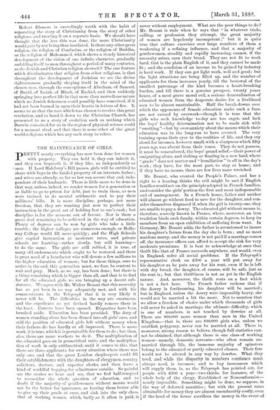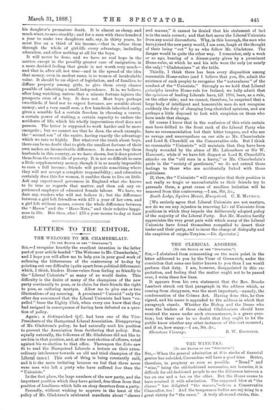THE MAINTENANCE OF GIRLS.
PRETTY nearly everything has now been done for women with property. They can hold it, they can inherit it, and they can bequeath it, if they like, as independently as • men. If Lord Halsbury's Bill passes, girls will be entitled to .share with boys in the landed property of an intestate father ; .and wives are already, as far as law can secure that end, inde- pendent of their husbands. There is little more to be done in that way, unless, indeed, we render women for a generation or so liable to go to prison for debt, just to train them, as men were trained, to do mental arithmetic and to pay their milliners' bills. It is more discipline, perhaps, not more freedom, that they are wanting just now to perfect their instruction in the great art of holding fast to one's cash ; but discipline is for the moment out of favour. Nor is there a great deal remaining to be achieved in the way of education. Plenty of degrees can be won by girls who take a little trouble; the higher colleges are numerous enough, or Hollo- way College would fill more quickly; and the High Schools give capital instruction at moderate rates, and private schools are learning—rather slowly, but still learning— to do the same. The girls are still robbed, it is true, of many old endowments which ought to be restored, and there is great need of a benefactor who will devote a few millions to the higher education of women ; but for those things, sure to arrive in the end, this generation must, we fear, be content to wait and pray. Much, as we say, has been done ; but there is a thing remaining which is bigger than all, and that is to find _for all the educated girls we are bringing up a decent sub- sistence. We agree with Mr. Walter Besant that this necessity has as yet been in no way adequately met, and with his commentators in the Telegraph that it is very likely it never will be. The difficulties in the way are enormous, and the expedients as yet devised hardly remove them in the least. Careers have been opened. Etiquettes have been brushed aside. Education has been provided. The duty of women standing alone has been dinned into all girls' ears, and still the position of educated girls left without money when their fathers die has hardly at all improved. There is more work, it is true, which it is permissible for them to do ; but then, also, there are more workers to do it. The multiplication of the educated goes on in geometrical ratio, and the multiplica- tion of work in only arithmetical, until it comes to this, that there are three applicants for every situation where there was only one, and that the great London shopkeepers could fill their establishments with the daughters of clergymen, country solicitors, doctors, and superior clerks, and then leave a kind of worldful begging for admittance outside. So painful are the stories we hear and see, that we feel half-tempted to reconsider the whole question of education, and to doubt if the majority of gentlewomen without means would not be the better for ignorance, as leaving them better able to give up their grade at once, and sink into the only class, that of working women, which, badly as it often is paid, is never without employment. What are the poor things to do ? Mr. Besant is rude when he says that "in whatever trade, calling, or profession they attempt, the great majority of women are hopelessly incompetent ;" but it is quite true that culture exercises over large numbers of them a weakening if a refining influence, and that a majority of gentlewomen, steadily and rapidly increasing, cannot, if the necessity arises, earn their bread. They are not fit to work hard, that is the plain English of it, and they cannot be made fit ; and the condition of an income to be gained by industry is hard work. If they can get light work, well and good ; but the light situations are being filled up, and the number of applicants for them increases yearly, till the bestowal of the smallest patronage of the kind becomes a heart-breaking burden, and till there is a genuine prospect, twenty years hence, of a most grave moral evil, a serious demoralisation of educated women from the desperate desire for a livelihood seen to be almost unattainable. Half the break-downs over which the opponents of female education make such a fuss, are not caused by overwork—though it is true that the girls who seek knowledge to-day are too eager, and lack the boys' healthy determination not to be made sick with "swotting "—but by over-anxiety about the means which their education was in the long-run to have secured. The very training opens their eyes to the realities of life, and they cry aloud for incomes, however small, with a sharpness which fifty years ago was absent from their tones. They do not possess, it must be remembered, the boys' grand relief,—their power of emigrating alone, and sinking or floating in a new land, where " grade " does not matter and " humiliation " is all in the day's work ; they have, for the most part, to stay at home ; and if they have no means, there are few lives more wretched.
Mr. Besant, who created the People's Palace, and has a right to a hearing, thinks the evil might be met if English families would act on the principle adopted in French families, and consider the girls' portion the first and most indispensable end of management. In a French house, father and mother will almost go without food to save for the daughter, and con- sider themselves disgraced if, when the girl is twenty-one, they are unable to pay a dowry. The educated girl without means is, therefore, scarcely known in France, where, moreover, an iron tradition binds each family, within certain degrees, to keep its members from an open exhibition of suffering from want. In Germany, Mr. Besant adds, the father is accustomed to insure his daughter's future from the day she is born ; and as most maidens marry, and the money is not paid if a marriage comes off, the insurance offices can afford to accept the risk for very moderate premiums. It is best to acknowledge at once that thrift like that of France succeeds anywhere, and would, even in England, solve all social problems. If the Telegraph's representative clerk on £300 a year will put away for his daughter as he puts away for his rent, even if he is left with dry bread, the daughter, of course, will be safe, just as the rent is ; but that thriftiness is not as yet in the English nature. And, moreover, the thrift rests on a fact which is not a fact here. The French father reckons that if the dowry is forthcoming, his daughter will be married ; but in England, unless the dowry were impossibly heavy, she would not be married a bit the more. Not to mention that we allow a freedom of choice under which thousands of girls will never be asked in marriage, the ultimate difficulty, which is one of numbers, is not touched by dowries at all. There are 800,000 more women than men in the United Kingdom,—that is, there are 800,000 girls who, unless we establish polygamy, never can be married at all. There is, moreover, strong reason to believe, though full statistics can- not be obtained, that although there is one class of working women—namely, domestic servants—who often remain un- married through life, the immense majority of spinsters belong to the educated or partly educated classes. Their fate would not be altered in any way by dowries. What they need, and while the disparity in numbers continues must always need, is incomes ; and to buy insurances which will supply them, is, as the Telegraph has pointed out, for people with 2300 a year—two-thirds, for instance, of the whole body of the clergy, Established or Nonconformist— nearly impossible. Something might be done, we suppose, in the way of deferred annuities ; but with the present rates obtainable for money they are almost unendurably costly, even if the head of the house sacrifices the money in the event of
his daughter's premature death. It is almost as cheap, and mach wiser, to save steadily; and for a man with three hundred a year to make two daughters safe, say, in thirty years, he must live on a third of his income,—that is, refuse them through the whole of girl-life every advantage, including education, and allow nothing at all for the boys.
It will never be done, and we have no real hope in the matter, except in the possibly greater ease of emigration, in a more decided feeling that grade is not worth very much— and that is, after all, not true—and in the spread of the idea that money, even in modest sums, is to women of incalculable value. It should be an object of legislation, and of families, to diffuse property among girls, to give them every chance possible of inheriting a small independence. It is, we believe, after long watching, untrue that a minute fortune injures the prospects even of a boy. It does not. Most boys, perhaps two-thirds, if bred not to expect fortunes, are sensible about money; and a very small sum, a few hundreds inherited early, gives a sensible lad a certain freedom in choosing a career, a certain power of waiting, a certain capacity to endure the accidents of life, which his wholly impecunious rival does not possess. The latter is supposed to work harder and be more energetic ; but we cannot see that he does, the stock example, the "second son" of the squire, having exactly the advantage which we rate so highly. But whatever the truth about boys, there can be no doubt that to girls the smallest fortune of their own makes an inconceivable difference. It does not buy them husbands in this country, as we have shown, but it does protect them from the worst ills of poverty. It is not so difficult to earn a little supplementary money, though it is so nearly impossible to earn a full income ; friends will provide something where they will not accept a complete responsibility; and education certainly does this for women, it enables them to live on little. Ask any experienced governess in England what she knows to be true as regards that matter, and then ask any ex- perienced employer of educated female labour. We have, we dare say, readers who will not believe it; but the difference between a girl left friendless with £75 a year of her own, and a girl left without means, covers the whole difference between the "Haves" and the " Have-Nots," and their relative happi- ness in life. But then, alas ! L75 a year means to-day at least £2,000.



































 Previous page
Previous page